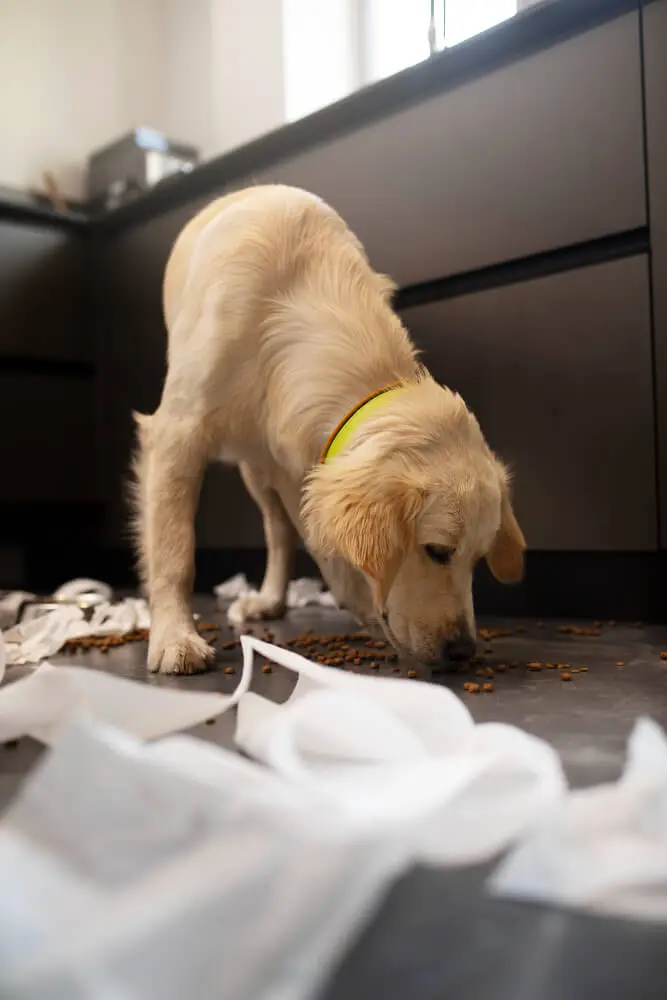According to a recent study by Forbes, 54% of dog owners regret owning a dog. This regret is often not about the dog itself but the challenges and responsibilities of dog ownership. There is no shame in admitting regret owning a dog. Here is why you might feel this regret, how to go around it, and practical solutions to turn these feelings around.
Is It Normal to Feel Regret After Getting a Dog?
Yes, it is completely normal to regret owning a dog after a few months, and you are not alone in this journey. Experiencing regret doesn’t make you a bad pet parent. It’s something that many dog owners go through, especially during the early days of owning a pet.
The daunting responsibilities, the significant lifestyle changes, or the unforeseen challenges can often lead one to sentimentally say, “I regret owning a dog.” It’s crucial to remember that this feeling is usually temporary and often subsides as you adapt to your new life with your furry companion. Over time, the bond you form with your dog will significantly outweigh the initial feelings of regret, turning the entire experience into a joyous one.
The Common Reasons for Regret
The reasons often range from unexpected challenges, such as the substantial time commitment and financial implications, to emotional stressors, like dealing with behavioral issues. Gaining insight into these reasons can provide valuable guidance for current and prospective dog owners, helping them prepare for and navigate the ups and downs of owning a pet. Let us discuss each in detail.
1. Excessive Chewing and Destruction
One of the frequent issues dog owners face is the destructive behaviors exhibited by their pets, mainly chewing. In Reddit and Quora forums, many have expressed frustration with dogs chewing on shoes and furniture. The culprit behind this behavior is, in fact, boredom. There is always meaning for every behavior your dog exhibits, and here is a guide to understanding dog behavior.
Solution
For excessive chewing and destruction, provide your dog with a variety of chew toys. It is best to get them indestructible dog toys as they offer value for money. This not only gives them an opportunity to chew on something other than your furniture but also keeps them entertained and mentally stimulated.
Regular physical exercise can also be very effective, as it helps to burn off excess energy that might otherwise be directed towards destructive behavior. Additionally, consider training your dog to understand commands like “leave it” or “drop it”, which can be very helpful in teaching them what they can and cannot chew on.
2. Insufficient Time for Care and Attention
Many owners underestimate the time it takes to care for a dog properly. This can lead to guilt or regret when they struggle to juggle their professional and personal commitments with their dog’s needs.
Solution
If you’re struggling to find time to properly care for your dog, consider hiring a professional dog walker or enrol your pet in a doggy daycare or dog boarding service. These services provide your dog with the care and attention they need when you’re unable to do so. Additionally, try to incorporate your dog into your daily routine as much as possible. This could mean taking them for a walk in the morning or including them in your weekend plans.
3. Unforeseen Allergies
Unfortunately, some owners find out they or a family member is allergic to dogs after bringing one home. Before getting a dog, consider spending time with different breeds to test for possible allergies.
Solution
If allergies become an issue, investing in a high-quality air purifier can be beneficial to reduce allergens in the home. Regular grooming of your dog can also help keep allergens at bay. Consult with an allergist for professional medical advice and possible treatments.
4. Noise and Mess
Barking at odd hours and creating a mess can be a significant source of stress for dog owners. Training your dog or seeking the help of a professional trainer can help mitigate these issues.
Solution
It’s crucial to invest time in training your dog to cope with noise and mess-related issues. Teaching your dog commands like “quiet” or “place” can help manage their behavior. If behavioral issues persist, consider seeking the help of a professional dog trainer or a behaviorist. Regular exercise and mental stimulation can also prevent boisterous behavior and mess. You should also consider gear that can help, for example, dog muzzles for barking.
5. Cleaning Up After Your Dog

One of the most daunting aspects of dog ownership can be dealing with urine and defecation inside the house, especially for puppies or older dogs. Accidents can occur for various reasons, such as the dog being improperly house-trained, medical issues, or anxiety. This not only creates a mess but also leaves behind an unpleasant odor. Cleaning up after your pet can be time-consuming, often leading to regret and frustration.
However, this challenge can be overcome with patience, consistent training, and sometimes, professional help. It’s crucial to remember that every dog is different, and some may take more time than others to learn. Using designated doggy pads or creating an outdoor toilet area can also help manage this issue effectively. Lastly, various cleaning products are available in the market specifically designed to neutralize pet odors, leaving your home fresh and clean.
Solution
To manage the challenges of cleaning up after your dog, ensure your pet is properly house-trained. Training involves teaching them to go outside or to a specific spot in the house. If accidents occur, clean them up immediately to prevent your dog from returning to that spot. Invest in a high-quality pet odor neutralizer and stain remover to keep your home clean and fresh. Try lysol for your cleaning needs. If your dog continues to have accidents, consult with a vet to rule out any potential medical issues.
These are just a few examples of the common reasons why people regret owning a dog. It’s important to remember that these issues are generally solvable, and with the right approach, former regrets can very well turn into tremendous joy and satisfaction.
Is It Normal to Have Anxiety After Getting a Dog?
Yes, it is quite normal to experience feelings of anxiety after getting a dog. This is often referred to as “Puppy Blues” or “Post Adoption Depression” and is usually brought on by the sudden realization of the responsibilities that come with pet ownership. The transition to becoming a pet parent involves significant changes in lifestyle, routine, and, often, unexpected challenges, all of which can contribute to feelings of anxiety.
This anxiety can manifest in many ways, such as constant worrying about the well-being of the dog, sleep deprivation due to the dog’s needs and schedule, or concerns about balancing work and other life commitments with the responsibilities of dog ownership. The lack of freedom, constant vigilance, and the financial implications of raising a pet can also cause stress.
While these feelings are normal, it’s essential to handle them effectively. Regular exercise, a balanced diet, and sufficient sleep can help manage anxiety. Reaching out to fellow dog owners, pet communities, or professionals for advice and support can also be beneficial. Remember to take time for yourself and engage in activities you enjoy. Ultimately, patience and understanding that it takes time to adjust to the new changes can alleviate feelings of anxiety. Over time, as you bond with your dog and develop a routine, these anxieties usually lessen, making way for a rewarding relationship.
If feelings of anxiety persist or escalate, it may be necessary to seek assistance from mental health professionals. Remembering that your well-being is vital for you to provide the best care for your pet is crucial.
Tips for Avoiding Regrets After Adopting a Dog
Owning a dog can be a joyful and rewarding experience, but it’s also a long-term commitment that should not be taken lightly. Here are some points to consider to ensure you don’t regret owning a dog.
- Understand the Responsibility
Firstly, understand that owning a dog is a significant responsibility. Dogs require daily care, including feeding, grooming, and exercising. They also need regular vet check-ups for vaccinations and overall health assessment. If prepared to meet these demands, you’re less likely to regret owning a dog.
- Estimate the Costs
Consider the financial aspect. Dogs can be expensive to maintain, including food, grooming supplies, vet bills, and pet insurance. Understanding these expenses in advance can prevent financial stress and help avoid regret.
- Assess Your Lifestyle
Your lifestyle should be compatible with the needs of a dog. If you enjoy traveling or have a job that requires long hours, dog ownership may not be for you. A mismatch between your lifestyle and the demands of a dog is a common reason some people regret owning a dog.
- Choose the Right Dog
Choosing the right dog for your lifestyle can also help prevent regret. Different breeds have different needs and temperaments. Researching the needs and characteristics of various breeds can help you find a dog that fits your lifestyle.
- Invest in Training
Investing in training for your dog can be very beneficial. A well-behaved dog is less likely to cause stress and frustration. Training also strengthens the bond between you and your dog, reducing the chances of regret.
Remember, owning a dog is a lifelong commitment. If you take the time to understand what it entails and prepare accordingly, you’re less likely to regret the decision.
When Do I Get My Life Back After Getting a Puppy?
In the beginning stages of bringing a puppy home, it’s natural to feel as if your life is significantly disrupted due to the new responsibilities and demands of puppy care. However, the intensity of this phase varies from individual to individual and depends heavily on the dog’s temperament, breed, and training.
Typically, as a rough guideline, you may find yourself getting back to a semblance of your old routine within 3-6 months. This is when puppies usually begin to mature and adapt to their environment, and it’s also when essential training efforts start to show results. It’s important to note, though, that every dog and every owner’s experience is unique.
During the first few weeks, the puppy requires constant attention and care, which includes feeding every few hours, frequent bathroom breaks, and playtime for social development. This phase may feel particularly overwhelming, but remember that it’s temporary. Fortunately, you can also use automatic dog feeders like the Blitz automatic dog feeder to automate feeding time. This leaves fewer tasks to handle.
As your puppy grows older, they will learn to control their bladder better, reducing the frequency of bathroom breaks. They will also start understanding routines and rules, making them easier to manage over time.
As your puppy becomes more self-reliant and the intense training and socialization efforts gradually scale down, you’ll find more time for yourself. However, it’s critical to understand that the responsibility of having a dog lasts for the pet’s lifetime, which can be over a decade. This responsibility becomes more manageable over time, but it never goes away.
Ultimately, the key to “getting your life back” after getting a puppy lies in patience, consistent training, and strong bonding, all of which pay off in the form of a well-adjusted, sociable, and obedient dog. Over time, the challenges faced in the early days become routine, paving the way for years of companionship and love.
What to Do When You Regret Getting a Dog

Regret after getting a dog can stem from various reasons, such as feeling overwhelmed by the responsibility, changes in lifestyle, or simply a mismatch between the dog’s temperament and the owner’s expectations. If you’re experiencing these feelings, it’s crucial to approach the situation with patience and mindfulness.
First, it’s essential to understand that these feelings of regret are often temporary, especially if you’re a first-time dog owner. The early days of dog ownership can be challenging, but they get better over time as you and your dog settle into a routine.
Second, don’t hesitate to seek support. Reach out to fellow dog owners, pet communities, or professionals who can advise and assist. In some cases, enlisting the help of a professional trainer can significantly ease the burden and help you build a better relationship with your dog.
Thirdly, try to identify the specific reasons for your regret. If it’s due to disruptive behaviors, training or behavior modification programs can help. If it’s due to a demanding schedule, consider hiring a dog walker or a doggy daycare service.
Lastly, if you’ve exhausted these options and still feel unable to provide for the dog’s needs, it’s okay to consider rehoming as a last resort. It’s a difficult decision, but in some cases, it may be the best for you and the dog. However, it’s essential to ensure the dog is rehomed responsibly through reputable shelters or pet adoption agencies.
A Guide to Responsibly Rehoming Your Dog
Rehoming a dog is not a decision to be taken lightly and should only be considered a last resort after exhausting all other options. If you’ve reached this point and still believe it’s the best choice, follow these steps:
- Acknowledge Your Feelings: Accept that feeling regretful or overwhelmed doesn’t make you a bad person. Recognizing that you cannot meet your dog’s needs is a responsible step. Ensure self-compassion and kindness towards yourself in this difficult decision.
- Prepare Your Dog: Ensure your dog is ready for a new home. This preparation includes ensuring they are up-to-date on vaccinations, are spayed or neutered, and have any health issues addressed. This makes your dog more attractive to potential new owners and is crucial for their well-being.
- Search for a New Home: Start by reaching out to close friends or family who know the dog and may be willing to provide a loving home. If this isn’t possible, extend your search to broader social networks, pet adoption websites, and reputable rescue organizations. Always prioritize your dog’s safety and well-being when considering potential homes.
- Screen Potential Owners: It’s essential to ensure your dog will be in capable, loving hands. Ask potential adopters about their lifestyle, pet ownership history, and plans for caring for your dog. A good match is vital for your dog’s happiness and adjustment.
- Transition Gradually: If possible, gradually introduce your dog to the new owner and environment. This can help reduce stress for your dog and help them adjust better to their new home.
- Stay in Touch: It may be comforting to ask for updates about your dog’s adjustment to their new home. However, respect the new owner’s boundaries and understand that your dog is now their responsibility.
Remember, rehoming is a tough choice, but sometimes it’s the best for both the dog and the owner. Always prioritize your dog’s well-being, happiness, and safety throughout the process.
How Do You End a Relationship with a Dog?
Ending a relationship with a dog can be one of the hardest decisions a pet owner may ever face. However, it may be the most responsible and loving choice you can make for your pet in certain circumstances. Before making any decisions, seeking professional advice from a vet or a pet behaviorist is crucial to understand if there are manageable alternatives.
If all options are exhausted, and you’re certain that the decision to end the relationship is in the dog’s best interest, approach the process with patience, kindness, and responsibility. First, alleviate any guilt. Remember that recognizing your limitations is an act of love and responsibility towards your pet. Second, prepare the dog for rehoming by maintaining regular routines, providing love and care, and meeting their health needs.
Next, actively seek a new home for your pet, prioritizing friends, family, or acquaintances familiar with your dog. If this isn’t possible, consider contacting reputable pet adoption agencies or animal shelters. Be honest about your dog’s behavior, health, and personality to ensure they find a suitable home.
Lastly, let go slowly. Gradual transitions can help reduce the stress your pet may experience. Remember to remain in touch with the new owners, ask for updates on your pet’s adjustment, and respect their boundaries. This process is challenging, but approaching it with patience and empathy can ensure the best outcome for you and your dog.
Potential Impact of Rehoming a Dog
While we’ve covered the emotional journey of rehoming a pet and the practical steps involved, it’s essential to consider the potential impact on any remaining pets in your household. Animals form bonds and routines, and a dramatic change, such as the departure of a companion, may cause stress or behavioral changes. Keep a close eye on them during this transition period and provide extra care and attention. If signs of stress persist, consider consulting with your vet or a pet behaviorist.
Additionally, reflecting on your experience and gathering insights that could prevent similar situations in the future is worthwhile. Perhaps the breed of the dog wasn’t suitable for your lifestyle, or maybe the timing was off. Use this experience to make more informed decisions should you consider pet ownership in the future.
Lastly, keep in mind the importance of self-care during this challenging time. Dealing with feelings of guilt or sadness is normal. Seek support from loved ones or professional counselors to navigate this emotional journey. Understanding and addressing your feelings is an essential part of the process, and remember, it’s okay to ask for help.
Tackling the challenges of dog ownership requires patience, persistence, and a bit of creativity. From behavioral training techniques to adopting a well-structured daily routine, these strategies can significantly ease the difficulties of dog ownership and transform the experience into a rewarding journey of companionship and joy.





